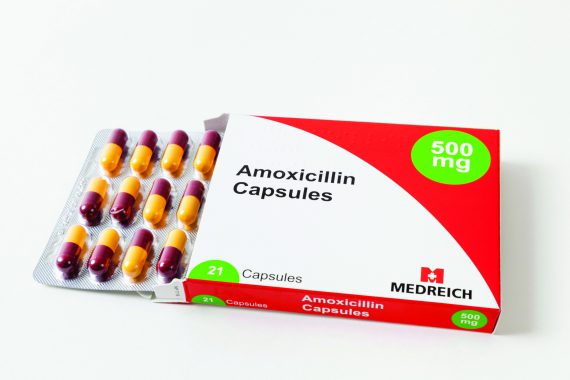The top five practice-changing papers of 2017

1. Antibiotics ‘no use’ in infected eczema
Antibiotics provide little to no clinical benefit over topical corticosteroids for mildly infected childhood eczema.
A study assigned just over 100 patients, aged between three months and seven years to receive either a topical or an oral antibiotic plus the corresponding placebo, or two placebos, as well as a topical corticosteroid and emollients.
Eczema symptom scores for each group showed similar levels of improvement over the following weeks, suggesting that the antibiotics did not play a clinically important role in recovery.
Study lead Dr Nick Francis, clinical reader at Cardiff University and practising GP, said: ‘Providing or stepping up the potency of topical corticosteroids and emollients should be the main focus in the care of milder clinically infected eczema flares.’
What does this mean for GPs?
Avoid antibiotics for mildly infected eczema in children and focus on educating patients and carers on using corticosteroids and emollients, stepping up potency if needed.
2. Intensive lifestyle regimen ‘cuts HbA1c’
An intensive lifestyle programme alongside drug therapy for type 2 diabetes reduced HbA1c levels to normal and even brought complete remission in some patients, a study has shown.
Just over 80 patients were assigned to take part in an intensive diet and exercise programme while taking diabetes drugs, or to receive standard care for a duration of either eight or 16 weeks, at which point they stopped taking their drugs and continued with lifestyle modification.
In the eight- and 16-week groups, 50% and 70% of patients respectively assigned to the intervention achieved normal glucose levels in the last week of treatment, compared with just 4% in each control group.
Lead author Dr Natalie McInnes, endocrinologist and assistant professor at MacMaster University, Ontario, said: ‘These findings… challenge the notion that type 2 diabetes is a permanent and progressive disease.’
J Clin Endocrinol Metab 2017;102(5):1596-1605
What does this mean for GPs?
Lifestyle change can induce remission of type 2 diabetes, and this can be used as a ‘selling point’ to patients when promoting exercise and other lifestyle interventions for treatment of type 2 diabetes.
3. ‘Avoid steroids’ in LRTI without asthma
GPs should not use oral steroids to treat
acute lower respiratory tract infection in adults who do not have asthma or other chronic lung disease, UK researchers have said.
Just under 200 non-asthmatic adults with acute chest infections but no evidence of pneumonia received 40mg of prednisolone for five days, with the control group of 200 receiving an identical placebo over the same time period.
The researchers found no reduction in the duration of cough or the severity of symptoms between two and four days after treatment in the prednisolone group compared with the placebo group.
Lead author Professor Alastair Hay, a GP and professor of primary care at the University of Bristol Medical School, said: ‘Our study does not support the continued use of steroids as they do not have a clinically useful effect on symptom duration or severity. We would not recommend their use for this group of patients.’
What does this mean for GPs?
Some GPs may be tempted to prescribe steroids for symptomatic relief in LRTIs in patients who do not have asthma or COPD. GPs can use this evidence when advising patients that their condition will improve without a prescription.
4. Complete the course ‘not evidence-based’
An article in the Analysis section of the BMJ claimed the reasons for advising patients to complete courses of antibiotics even if they feel better are not based on current evidence.
The authors claimed evidence for standard duration of antibiotic courses was weak, with some studies showing shorter courses are just as efficient in clearing disease.
But RCGP chair Professor Helen Stokes-Lampard said: ‘We cannot advocate widespread behaviour change on the results of one study.
‘It is important that people have clear messages and the mantra to always take the full course of antibiotics is well known. Changing this will simply confuse patients.’
What does this mean for GPs?
Things may change but, pending further studies to back up these claims, advise your patients to complete their course.
5. Algorithm ‘improves bowel cancer screen’
A new algorithm used to detect bowel cancer risk based on blood test results could improve the accuracy of screening, according to new research.
The algorithm identifies at-risk patients by looking for subtle changes in blood counts that might be warning signs in advance of overt symptoms.
Researchers found the algorithm had a positive predictive value of just under 9%, meaning a 9% probability that patients who score positively are truly at risk. NICE’s cut-off for referral is ≥3%.
Professor Julietta Patnick, a visiting professor at the University of Oxford and one of the authors, said: ‘The beauty of this is that it can be applied to GP surgery data, running quickly and efficiently to give a more accurate level of risk.’
Cancer Medicine 2017; 6(10):2453–2460
What does this mean for GPs?
If introduced to patient records, this could mean quick, accurate screening in primary care.
Visit Pulse Reference for details on 140 symptoms, including easily searchable symptoms and categories, offering you a free platform to check symptoms and receive potential diagnoses during consultations.









